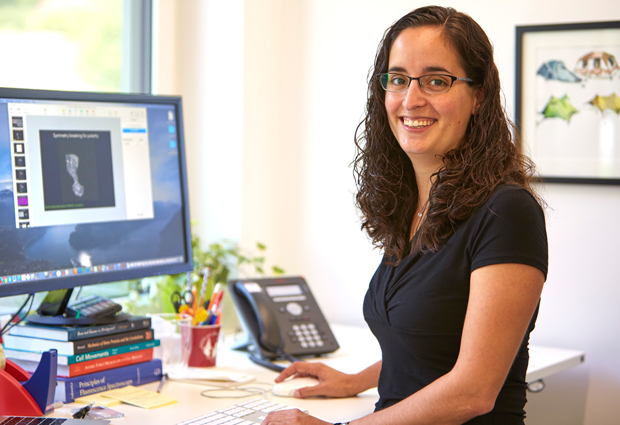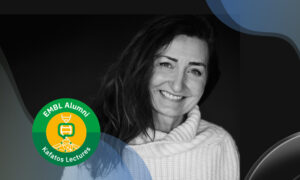
Welcome: Alba Diz-Muñoz
New group leader combines physics and biology to answer the 'hows' of cell movement

The Diz-Muñoz group plans to explore how mechanical properties affect the movement of immune cells or cells in a zebrafish embryo. Working at the interface between mechanics and biology, they will investigate how cell behaviour and signalling cascades inside the cell are influenced by factors like the forces the cell is subjected to, or the ones it generates.
I want to help my people find and follow their own paths.
Why do you do what you do?
I have a hard time letting questions go unanswered; I really enjoy designing experiments to tease apart how a biological process works.
Name one tool you can’t do without
I’d say the tool that got me into this business, and is the reason I’m still in it, is the microscope. I went into biology because it’s beautiful and intriguing. In my PhD I worked with zebrafish embryos, and realized that developmental processes are just stunning! You wonder ‘how can this happen reproducibly every time? How do the cells know what they are doing, where they’re going, and when?’ The “how” is the question that drives me.
Whose work at EMBL intrigues you? Do you already have potential collaborators in mind?
Ever since my job interview I’ve been discussing possible collaborations with Carsten Schultz. I think his work and ours interface very nicely, because we bring the mechanics and they do top-notch, state-of-the-art signalling sensors, so hopefully together we can figure out how cell and tissue mechanics affect behaviour.
I would also like to work with Pierre Neveu, Jan Ellenberg and Martin Jechlinger, to name a few. It is becoming clearer that cell and tissue mechanics play bigger roles than previously thought. Trying to see what those properties are and how they change in processes like stem cell differentiation, cell division or cancer metastases would be very interesting.
What is your philosophy for running your lab?
Well, I am aware that building a lab depends a lot on the people you hire, and how those personalities fit together. My philosophy is that we’re individuals, but we work as a team, and try and help each other to answer very hard questions. So I’m here as a member of that team, which means I provide an infrastructure and a space where we can develop ideas and projects together.
What will you be looking for as you build your group?
People who are curious and motivated. I think that a motivated and intelligent person can learn anything.
If there was a motto hanging at your lab’s door, what would it be?
It would be “Let’s give it our best shot!”. That’s the spirit that I’ve always done science with. If you choose a new, risky project you never know whether it is going to work or not. So I would say “Give it your best shot!” and see what happens.
How have you felt about your transition from postdoc to group leader?
For me it’s been a change in perspective. As a PhD student and postdoc, I was the one deciding what I wanted and when to do it. Now as a group leader, things are different, because the focus has shifted to the interests and time of my people. I want to help my people find and follow their own paths.
Do you have any advice for someone thinking of making that move?
Go for it! I applied for this job early in my postdoc, thinking ‘I’m gonna give it a shot, see what happens, and learn from the experience…’
My advice is to try early, interview and get some practice. If it doesn’t work, then next time you will do better. And if you have good ideas and you can justify why you’re the person for the job, you might get it!


